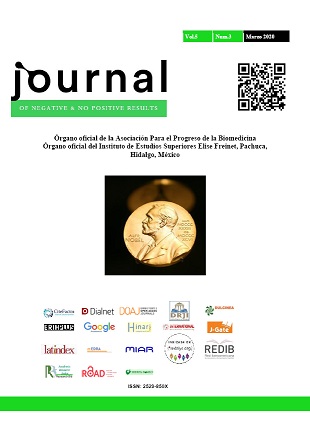Eating habits and their impact on the academic performance of students of the Pharmacy Degree
DOI:
https://doi.org/10.19230/jonnpr.3256Keywords:
food, feeding, eating habits, healthy, academic performanceAbstract
Introduction. According to the United Nations Food and Agriculture Organization (FAO), human food is defined as a consistent and educatable voluntary process.
Objective. To identify the impact of eating habits on the academic performance of students of the ICSa Pharmacy degree.
Methodology. A cross-sectional, observational and prospective study was carried out. The MAPFRE Foundation's Healthy Eating survey was adapted and the sampling was non-probabilistic. Results. We applied 102 surveys, predominated the female sex, with an average age of 20 (± 1) years. About 50%, he mentioned bringing food from his home and having the habit of having breakfast, however, less than half of the sample consumes at least one fruit and/or vegetable a day. A 76% believe their food if it impacts their academic performance.
Conclusions. It is important to make students aware of the correct way to eat and the impact on their academic performance, as well as to promote healthy lifestyles and provide them with necessary and correct information to properly select their food and drinks, otherwise that food selection will not be positive, that is, negative.
Downloads
References
Mizón, C., Atalah, E. (2014). Transición Epidemiológica. Lecciones aprendidas del Proyecto North Karelia. Rev Chil Nutr. 31(3):276-282
Alicia, B. (2015). Evaluación del estado nutricional en escolares de bajos recursos socioeconómicos en el contexto de la transición nutricional. Arch Argent Pediatr. 103(3):205-2011
Rodríguez, F., Palma, X., Romo, B., Escobar, B., Aragú, G., Espinoza, L., McMilla, N, Gálvez, J. (2013). Hábitos alimentarios, actividad física y nivel socioeconómico en estudiantes universitarios de Chile. Nutr Hosp. 28(2):447- 455.
Bari, I., Lukesi, Z. (2013) Nutritive value of meals, dietary habits and nutritive status in Croatian university students according to gender. Int J Food Sci Nutr. 54: 473-484.
Arroyo, M., Rocandio, A., Ansotegui, L., Pascual, E., Salces, I., Rebato, E. (2016). Calidad de la dieta, sobrepeso y obesidad en estudiantes universitarios. Nutr Hosp; 21: 673-679.
Osorio, J., Weisstaub, G. (2012). Desarrollo de la conducta alimentaria en la infancia y sus alteraciones. Rev Chil Nutr. 29 (3): 280-285.
Busdiecker, S., Castillo, C., Salas I. (2010). Cambios en los hábitos de alimentación durante la infancia: una visión antropológica. Rev Chil Pediatr. 71 (1): 5-11.
Bollat, P., Dura, T. (2012) Modelo dietético de los universitarios. Nutr Hosp. 23 (6): 626-627
FAO. (s.f.). Recuperado el 19 de Abril de 2015, de fao.org: www.fao.org/docrep/013/am283s/am283s05.pdf
FAO. (2016). Recuperado el 23 de Abril de 2018, de fao.org: http://www.fao.org/3/a-i6491s.pdf
FundacióMafre. (s.f.). Recuperado el 15 de Abril de 2018, de fundacionmapfre.org: https://www.fundacionmapfre.org/fundacion/es_es/images/encuesta-alimentacionsaludable_tcm1069- 220095.pdf
Klepp, K. (2014). Twelve year follow-up of a school-based health education programme. The Oslo Youth Study. Eur Public Health. 4: 195-200
Sweeney, N., Horishita, N. (2015). The breakfast-eating habits of inner city high school students. J Sch Nurs. 21: 100-5.
Siega-Riz, A., Popkin, B., Carson, T. (2015). Trends in breakfast consumption for children in the United States. Am J Clin Nutr. 67: 748S-756S.
López, C. (2012). Educación nutricional de niños/as y adolescentes. En: Alimentación Infantil y Juvenil. Estudio Enkid. Serra L, Aranceta J (eds.). Masson, 61-68. Barcelona.
Published
Issue
Section
License
All accepted originals remain the property of JONNPR. In the event of publication, the authors exclusively transfer their rights of reproduction, distribution, translation and public communication (by any sound, audiovisual or electronic medium or format) of their work. To do so, the authors shall sign a letter transferring these rights when sending the paper via the online manuscript management system.
The articles published in the journal are freely used under the terms of the Creative Commons BY NC SA license, therefore.
You are free to:
Share — copy and redistribute the material in any medium or format
Adapt — remix, transform, and build upon the material
The licensor cannot revoke these freedoms as long as you follow the license terms.
Under the following terms:
Attribution — You must give appropriate credit, provide a link to the license, and indicate if changes were made. You may do so in any reasonable manner, but not in any way that suggests the licensor endorses you or your use.
NonCommercial — You may not use the material for commercial purposes.
ShareAlike — If you remix, transform, or build upon the material, you must distribute your contributions under the same license as the original.
No additional restrictions — You may not apply legal terms or technological measures that legally restrict others from doing anything the license permits.

This work is licensed under a Creative Commons Attribution-NonCommercial-ShareAlike 4.0 International License

























